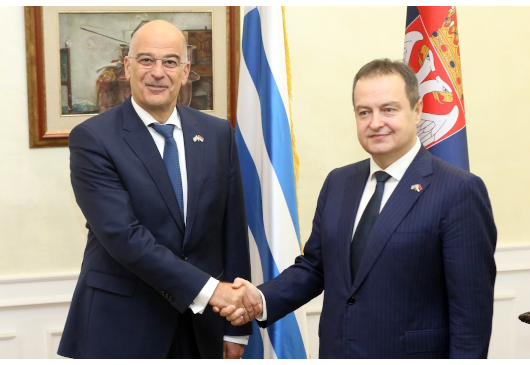 N. DENDIAS: Dear friend, I am truly glad to be in Belgrade, enjoying your warm hospitality.
N. DENDIAS: Dear friend, I am truly glad to be in Belgrade, enjoying your warm hospitality.
We had the opportunity to exchange views on a broad range of topics and discuss ways to further strengthen our excellent ties.
Ties that are based on the solid friendship between our peoples, our common religious heritage and our cultural proximity.
On the political level, the 3rd Meeting of the Hellenic-Serbian High Level Cooperation Council, to be held in Athens on December 11, will be a great opportunity to progress into a new era in our bilateral relations.
Cooperation, not only on the political level, but on a variety of fields, such as the economy -including road and railway- energy, digital interconnectivity and commerce.
Greeks and Serbs have always stood by each other. In good times and in bad times.
Today, Greece is the strongest supporter of Serbia’s European perspective. To us, it is clear that Serbia belongs to the European family, as do the rest of the Western Balkan countries. We stand ready to assist our neighbours towards the completion of their European path.
EU accession is a key element in achieving peace, stability and prosperity in our region. The European project can never be complete without the countries of the Western Balkans, provided of course they do their part by fulfilling the relevant criteria.
In this regard, I should like to seize this opportunity to congratulate Serbia, the Serbian people and the Serbian government on the impressive economic reforms they have undertaken, which have already yielded significant results.
My colleague and I also touched upon a number of regional issues.
We talked about recent developments in the Balkans, but also in the Eastern Mediterranean, where we are dealing with a steady escalation of Turkey’s violations of international legality.
Greece has long been recognized as a pillar of stability in the region and, hence, highly appreciates Serbia’s efforts towards the promotion of stability in its own environs.
That’s why our position concerning the status of Kosovo will remain unaltered until a final agreement is reached, as reaffirmed by Prime Minister Mitsotakis during his recent meetings with President Vucic and Prime Minister Brnabic.
We also raised the Cyprus problem, underscoring the importance of reopening the negotiation process, towards a settlement based on the Resolutions of the UN Security Council. Serbia’s principled stance on the Cyprus issue is indeed appreciated. We also very much appreciate the continued Serbian participation in the UN Peace Keeping Force (UNFICYP) on the island.
The trilateral cooperation scheme with Cyprus [and Greece and Serbia], raised as an issue by my dear colleague, is something that we gladly accept and we will facilitate it, so that it takes place in the very near future.
In closing, I would like to once again thank you, dear colleague, for the constructive dialogue, for your hospitality, which I look forward to reciprocating very soon in Athens.
Thank you very much.
JOURNALIST: Minister, lately the confidence of the peoples in the Balkans towards the EU has been severely undermined, due to the rejection of Skopje and Tirana’s application for the opening of the accession negotiations. How could Greece play a more central role given the fact the Balkans constitute our natural hinterland. We are well familiar with the Balkans, probably better than any Central European country.
Ν. DENDIAS: Thank you very much for your question. It is greatly appreciated. As you know, the enlargement of the European Union towards the Western Balkans is a cornerstone of Greek foreign policy. It has been our strategy for years, not because this strategy is based on our national interest -which, by the way, it is- but because we believe that it is compatible with the values of the European Union. We believe that the Western Balkans and primarily Serbia belong to the EU. So, we were, I cannot say surprised, because we had talks in advance, but I am saying that we were not happy with the fact that those countries, North Macedonia and Albania, were not given a date at the last European Council. What we wanted to do and what Prime Minister Mitsotakis is trying tο do is to reverse this decision. We will do everything in our capacity in order for these countries, North Macedonia and Albania, to get a date. And we will facilitate the process towards the European Union. Of course, all this is subject to these countries meeting the European criteria. Let’s be frank. We are not doing favors to anyone. We are promoting a common European future, based on the European acquis. That is what we are doing, that is what friends are for, that is what Greece supports. Greece is a true friend both of North Macedonia and Albania. That is what we are trying to achieve.
November 14, 2019


